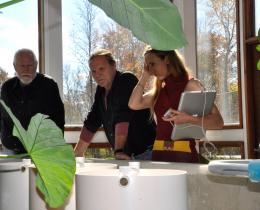Omega: How did you come to dedicate your life to water reclamation?
John: As a child, I lived along the shores of the western end of Lake Ontario on Hamilton Bay. The lake’s life and moods were part of my daily life. My bedroom was 100 feet from the water and I could hear the water lapping on the shore at night. I walked two miles to school alongside two streams that bound me to the landscape. I canoed, kayaked, and sailed whenever I could. My imaginary landscape was inhabited by water and even my dreams and nightmares were occupied by storms and whirlpools. Sadly, I watched the shore of Hamilton Bay become degraded by industries that were situated on the opposite shore. I made the connection between pollution and the disappearance of life in the water and, without knowing what ecology meant, I began to think in ecological terms although, at first, not in a positive or creative way.
Omega: What is the most interesting thing you’ve learned by looking to the natural world for solutions?
John: The most interesting thing I have learned is the ability of living systems—given enough biological diversity—to self-organize, self-design, self-repair, self-replicate, and solve multiple problems for people. These include growing foods, generating fuels, cleaning up pollutants, treating sewage and other wastes, and repairing damaged environments. These systems must be powered by the sun, have representative species from all of the kingdoms of life, and be derived from at least three or four parent ecosystems. Guided by people, these systems can evolve into Eco Machines, and, in theory, can live over vast reaches of time. These technologies work and have the ability to transform the planet for the better. They can be beautiful as well.
Omega: How can natural solutions to water management be adopted more widely across the country and the world?
John: Legislation would be a good first step. If future environmental solutions have to be carbon positive by law, meaning that the technology sequesters more atmospheric carbon than it releases back into the atmosphere, then our efforts at water management will also help to stabilize climate. In other words, living technologies will become our partners in climate improvement as well as water quality improvement.
A second factor that would accelerate the process and permit its globalization would be a carbon tax on fossil fuels. The idea is not yet popular, but if polluters paid for the right to emit greenhouse gasses then the financial resources could be available for widespread water and soil restoration.
A third way is to find ecological techniques for repairing lakes, streams, and inshore marine waters that are orders of magnitude less expensive than the best technologies of today. I can foresee the day when we will build low-cost incubators of beneficial organisms. These incubators, possibly housed within greenhouses, could grow billions of beneficial organisms daily, including bacteria, algae, fungi, and microscopic animal life, and then be pumped into degraded streams and lakes. Comparable eco-technologies could be used to restore salt ponds, marine embayments, and other inshore waters. Eventually, such incubators would cause their receiving waters to become healthy enough to begin to heal themselves.
Omega: What do you think our biggest global challenge is relating to water?
John: The biggest global challenge for water is the lack of interest on the part of many people. Water is not commonly seen as the primary foundation for life, nor do people see that the quality of water dictates the quality of life. Our fate hinges on our respect for water. People have to begin to treat water as sacred and dedicate themselves to its health and conservation.
Omega: What gives you hope for the future and our relationship with water?
John: We have the skills to stabilize climate while feeding humanity. With the help of the sun and the wind, as well as from organic surplus materials, we have the resources to provide our own energy on a worldwide scale. We have developed living technologies to heal the waters, the lifeblood of the planet. If the financial resources to underwrite planetary stewardship on a global scale can be found, then there is hope for the future. In a stewardship culture, our emerging social and economic systems may well create much more equity as well as tolerance between peoples.


